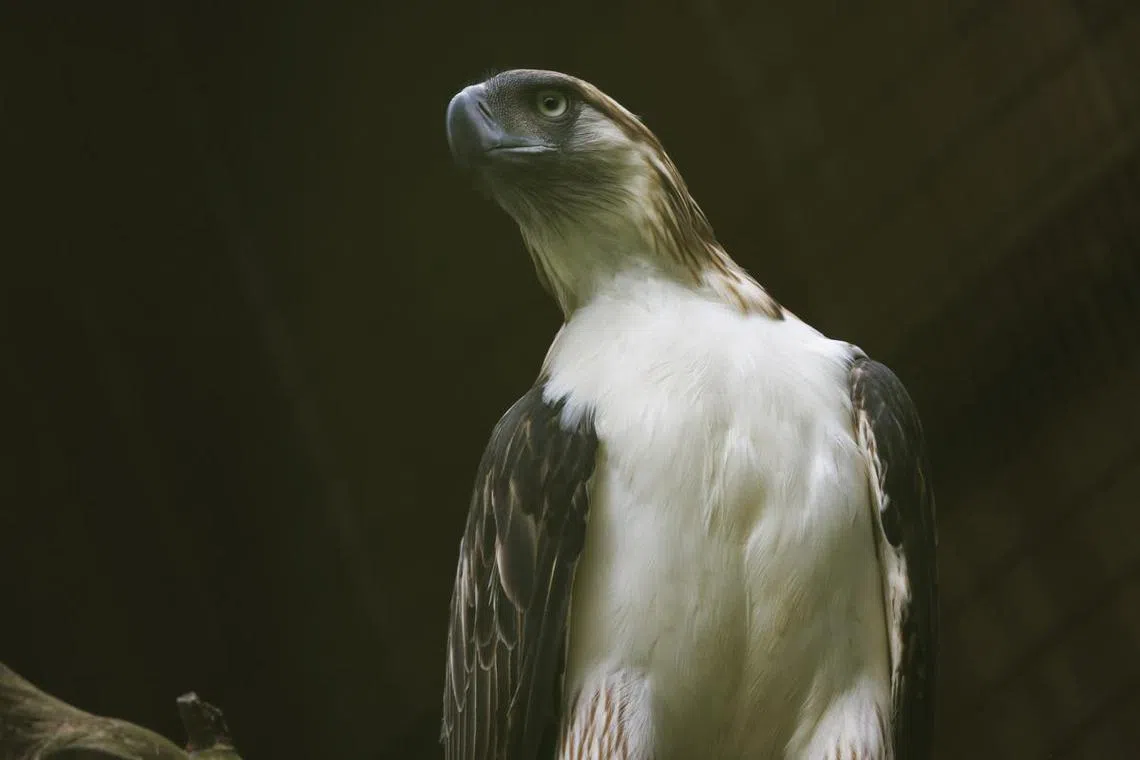Singapore, Manila to resume breeding programme for critically endangered eagle
Sign up now: Get ST's newsletters delivered to your inbox

Talks are being held to airlift a male Philippine eagle to Singapore “to establish a breeding pair” with a female that is under the care of Mandai Wildlife Group.
PHOTO: MANDAI WILDLIFE RESERVE
Singapore and the Philippines are resuming plans to set up a joint breeding programme to guarantee the survival of the critically endangered Philippine eagle.
The two sides are currently holding talks to airlift a male eagle to Singapore “to establish a breeding pair” with a female that is already under the care of Mandai Wildlife Group, President Tharman Shanmugaratnam said on Aug 15 during his state visit to the Philippines.
The female eagle – named Sambisig – is one of two eagles that the Philippines handed over to Mandai Wildlife Group in 2019
Attempts to pair the two eagles were unsuccessful as they were not a match.
The male eagle – Geothermica or Geo – died on Sept 7, 2023, due to a severe respiratory tract infection.
“It was a case of unrequited love,”
Mr Tharman said he is hoping Singapore will become home to another Philippine eagle just as Singapore and Manila mark 55 years of diplomatic ties in 2024.
Dr Cheng Wen-Haur, deputy chief executive of Mandai Wildlife Group, said: “Discussions continue around acquiring a male Philippine eagle and exploring the feasibility of establishing a second breeding pair.”
The Philippine eagle is listed as “critically endangered” by the International Union for Conservation of Nature.
The species used to roam in fairly large numbers across the Philippines, but decades of deforestation and the encroaching urban sprawl have nearly decimated its territories and its population has rapidly declined.
Only about 800 are left in the wild today, with 32 kept in breeding centres.
Officials in Manila told The Straits Times that the Philippines is prepared to send more than just one eagle to Singapore to increase the chances of a successful breeding programme.
“It’s a fail-safe, an insurance policy. As the saying goes, we wouldn’t want to be putting all our eggs in one basket,” said Dr Jayson Ibanez, director for research and conservation at the Philippine Eagle Foundation (PEF).
He said the “insurance strategy is to spread your breeding stock to different institutions”.
Mandai Wildlife Group’s Dr Cheng said: “This approach supports the long-term genetic diversity and sustainability of the species under managed care.
“Having the species outside their native country serves as a crucial conservation measure, addressing risks associated with small wild populations and acting as an assurance colony against catastrophic events that could devastate entire populations.”
Philippine Environment Minister Maria Antonia Yulo Loyzaga told The Straits Times that there was still “a need to assess the current conditions and really study the terms of any future arrangements with regard to the Philippine eagle”.
Dr Ibanez said the male eagle Geo’s death in 2023 was not totally unexpected.
“We were dealing with biological organisms. Mortalities can happen,” he said.
He added that Mandai Wildlife Group followed “standard husbandry techniques”.
Dr Ibanez said: “They did their best.”
He said officials on both sides had been working on a “risk assessment” report to improve the chances of a successful pairing that could eventually see the eagles being born in Singapore.
Dr Cheng said Mandai Wildlife Group also supports efforts by the Philippine Environment Ministry and PEF to grow the Philippine eagle population in the wild, with the help of local and indigenous communities.
Conservation officials have struggled to get the eagles to breed successfully in their natural habitats.
These eagles pair for life and lay just a single egg every two years. In the wild, a pair will require about 7,000ha of forest land to successfully breed.
But hunters and poachers pose a constant threat to younglings, which stay in the nest for at least two years.
The Philippine eagle is considered a national treasure and is featured on the Philippine 1,000 peso bill.
With a wing span of 2m and a body length of 1m, it is a top predator that feeds on monkeys, lemurs, squirrels and bats.
Mandai Wildlife Group has successfully bred many threatened bird species, including the Santa Cruz ground dove, straw-headed bulbul and blue-throated macau.
It currently has 30 conservation projects and supports groups in the Philippines working to protect the Philippine cockatoo, southern rufous hornbill and other endangered species.



